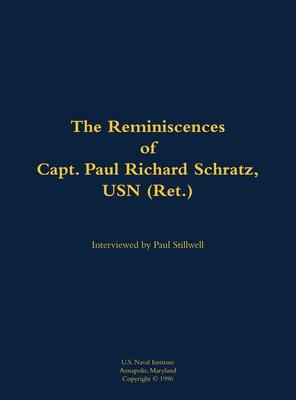This memoir covers the life and career of an officer who distinguished himself as a submariner and as a writer and educator. He was also an accomplished violinist, playing in a number of symphonies, depending on where his naval career took him. After graduation from the Naval Academy in 1939, he served until late 1941 in the heavy cruiser USS Wichita (CA-45), which was involved in neutrality patrol in the Atlantic. He was a student in submarine school in early 1942, then performed wartime service in the submarines USS Mackerel (SS-204), USS Scorpion (SS-278), USS Sterlet (SS-392), and USS Atule (SS-403). After hostilities ended in 1945, Schratz became officer in charge of the captured Japanese submarine I-203 and delivered her to Hawaii. He then served the Bureau of Naval Personnel before a stint as temporary skipper of the submarine USS Burrfish (SS-312) when she was reactivated in 1948. He then commanded the submarine USS Pickerel (SS-524) during Korean War reconnaissance missions and a long submerged transit from Hong Kong to Pearl Harbor. After duty in the political-military policy division of OpNav in the early 1950s, he served as executive officer of the submarine tender USS Nereus (AS-17) under skipper "Dusty" Dornin and was later Commander Submarine Division 52. Subsequent billets were on the staff of Commander Anti-Submarine Defense Force Atlantic Fleet, as a student and staff member at the Naval War College, and as commanding officer of the submarine tender USS Fulton (AS-11) in the early 1960s. During this period, Schratz believed, he lost his opportunity for major command because he published a facetious story in 1963 about Vice Admiral H. G. Rickover’s burial plans. He had duty from 1962 to 1964 on the Joint Staff, including service as a delegate to the 18-nation disarmament conference in Geneva, Switzerland, then served in the Department of Defense. After earning a doctorate from Ohio State University in 1966, he was on the faculty of the National War College, 1966-68. He retired from active duty in 1969, then ran an international studies program at the University of Missouri. Other post-retirement jobs were in education, including giving instruction at the various war colleges and at Georgetown University. He also wrote widely, both books and articles.
| FindBook |
有 1 項符合
Reminiscences of Capt. Paul Richard Schratz, USN (Ret.)的圖書 |
 |
Reminiscences of Capt. Paul Richard Schratz, USN (Ret.) 作者:Schratz 出版社:US Naval Institute Press 出版日期:2018-03-05 語言:英文 規格:精裝 / 356頁 / 27.94 x 21.59 x 2.06 cm / 普通級/ 初版 |
| 圖書館借閱 |
| 國家圖書館 | 全國圖書書目資訊網 | 國立公共資訊圖書館 | 電子書服務平台 | MetaCat 跨館整合查詢 |
| 臺北市立圖書館 | 新北市立圖書館 | 基隆市公共圖書館 | 桃園市立圖書館 | 新竹縣公共圖書館 |
| 苗栗縣立圖書館 | 臺中市立圖書館 | 彰化縣公共圖書館 | 南投縣文化局 | 雲林縣公共圖書館 |
| 嘉義縣圖書館 | 臺南市立圖書館 | 高雄市立圖書館 | 屏東縣公共圖書館 | 宜蘭縣公共圖書館 |
| 花蓮縣文化局 | 臺東縣文化處 |
|
|
圖書介紹 - 資料來源:博客來 評分:
圖書名稱:Reminiscences of Capt. Paul Richard Schratz, USN (Ret.)
|











